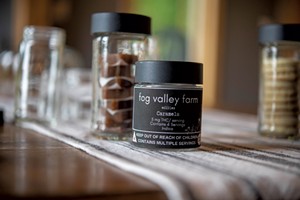
Cannabis edibles get a bad rap. Homemade versions with unknown dosing and delayed effects have caused enough unfortunate experiences to keep many folks away from unmarked trays of brownies at parties. But, as Vermont prepares for the legal retail cannabis market to launch on Saturday, October 1, it’s no surprise that some of the state’s talented food and drink producers are preparing to enter the budding industry. In a state obsessed with farm-to-table fare, developing recipes with locally grown cannabis is a logical next step. And, with strict regulations governing dosing, testing and labeling, these aren’t your stoner friend’s mystery edibles. We talked with some local food and beverage purveyors about how they’re preparing to enter the adult-use market, from licensing and sourcing to switching from regular baked goods to cannabis-infused edibles. Wonder Woman Fog Valley Farm, Middlebury, fogvalleyfarm.com Martha Bruhl has a competitive edge in Vermont’s adult-use market: She holds manufacturer license 0001. The license for Fog Valley Farm, Bruhl’s cannabis edibles business, was approved at a Vermont Cannabis Control Board meeting on August 31, along with those of two others: Family Tree Cannabis and Dalen. Last week, the state approved a fourth manufacturer, X-Tract Vermont. “It’s a great opening line when I’m talking to people,” Bruhl said. “‘Hey, you’re a retailer? I do edibles. My license number is 0001.'” Fog Valley Farm is named for the road on which Bruhl’s family lives in New Haven, where the 22-year-old baker launched her business in the spring. Over the summer, Bruhl tested her large-scale baking skills, making custom cakes and selling pies, cookies and other treats at the Shelburne Farmers Market. Now that she’s licensed to manufacture cannabis edibles, Bruhl will shut down the “regular baked goods” part of her biz and move into a commercial kitchen in Middlebury. (Cannabis processing and non-cannabis food processing cannot happen in the same facility, per the Vermont Department of Health.) Bruhl hopes to have a simple line of single-bite, small-tetrahydrocannabinol (THC)-dose cookies and caramels — and eventually ice cream — at one or two retail locations by mid- to late October. Her base recipes for chocolate chip cookies; lemon drop shortbread cookies; and dark, light and sea-salted caramels are ready, but she’s still working on sourcing cannabis flower from licensed growers. Once she has that, she’ll make infused butter and baked goods and send them to the lab for testing. Bruhl…
Home » Vermont Food and Drink Producers Prepare for the Adult-Use Cannabis Market
